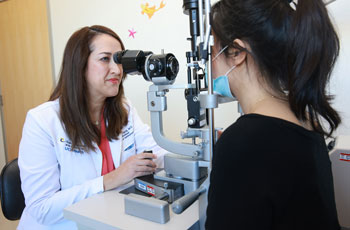Eye conditions need to be addressed before cataract surgery, expert says
Treating other eye issues improves outcomes, patient satisfaction

IN THE NEWS: Routine cataract surgery can become complicated if the affected eye has other issues.
 Skilled surgeons, such as those at the UCI Health Gavin Herbert Eye Institute, are aware of these conditions and understand how to manage them. Ophthalmologist Dr. Marjan Farid spoke to Healio about how she approaches these issues with her patients.
Skilled surgeons, such as those at the UCI Health Gavin Herbert Eye Institute, are aware of these conditions and understand how to manage them. Ophthalmologist Dr. Marjan Farid spoke to Healio about how she approaches these issues with her patients.
“The goal in cataract surgery is to have optimized refractive outcomes, and in eyes with other ocular morbidities, the success and patient satisfaction will be affected if they are not properly addressed.”
A number of eye surface and corneal conditions are treatable and should be addressed before any planning for surgery.
“It is incumbent upon the surgeon to pause, treat them and then bring the patient back to look for regularity on topography.”
Farid leads the UCI Health Severe Ocular Surface Disease Program. She is one of a handful of U.S. ophthalmologists able to perform an ocular stem cell transplantation, a complex, sight-saving surgery.
It is largely because of Farid’s work that the Gavin Herbert Eye Institute was named by the Holland Foundation for Sight Restoration in 2023 as the first of five centers of excellence for severe ocular disease in the United States and the only one on the West Coast.
Farid, a professor of ophthalmology at UC Irvine School of Medicine, performs all types of corneal transplants, including femtosecond laser-enabled lamellar keratoplasty. She also performs limbal stem cell transplants and artificial corneal transplants to treat severe ocular surface disorders. Her research focus is on corneal surgery and the use of the femtosecond laser in corneal transplantation. Her work has appeared in a number of peer-reviewed journals.




